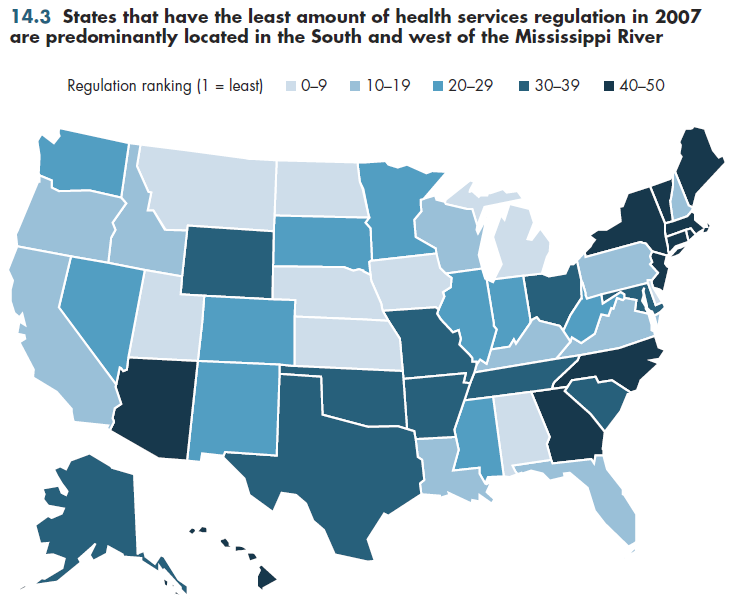Download PowerPoint versions of figure.
Inside Collection (Book): American Health Economy Illustrated
14.3 US Health Sector Is Highly Regulated
Summary: The health sector is more highly regulated than almost any other segment of the U.S. economy. However, the extent of regulation varies widely across states.
For decades, experts have regarded the health sector as one of the most highly regulated areas of the U.S. economy. State governments license many health providers. In more than 65 percent of states, hospitals, and/or nursing homes must secure a certificate of need—that is, the state's permission—before building or expanding a health facility or adding equipment to it. Health insurers cannot operate in a state without its approval and in some cases, review of its premium rates. FDA approval is required to bring drugs and medical devices to market. Finally, in many states, special rules or limits govern how the courts handle medical liability cases compared with how a bread-and-butter tort case would be adjudicated.
Even this incomplete description of regulation shows that states play an important role in regulation of health services. Consequently, differences across states in the scope and stringency of various health services regulations are quite large.
Figure 14.3 illustrates a flavor of this diversity. As with any index, this one cannot count every possible aspect of regulation. Moreover, even if it could, reasonable people might disagree on how to combine the various scores for potentially dozens of different areas of health services regulation. Should the score assigned to health facilities regulation receive the same weight as the score for regulation of health professionals? With this caveat, this particular ranking seems to show that states in the Rocky Mountain and Far West regions generally regulate health services less (or less stringently, depending on the particular area of regulation being examined) than do states in the Northeast or even Southeastern regions.

If fully implemented, the new health reform law will do two things. First, it will significantly increase the amount of health services regulation. Second, it will shift more regulation to the federal level. States still will play a role in implementing the details of how, for example, state health exchanges will work. However, they will do so under a new set of "rules of the road" established by the federal government.
Downloads
References
- Graham J. Index of Health Ownership. 3rd Edition. Pacific Research Institute. 2009. http://www.pacificresearch.org/docLib/20090720_IHOP_3_2009.pdf (accessed July 2010).
Collection Navigation
- « Previous module in collection 14.2 Concentration in Health Insurance Industry
- Collection home: American Health Economy Illustrated
- Next module in collection » 14.4 Unionization Rates in the Health Industry
Content actions
Give feedback:
Download:
Add:
Reuse / Edit:
Twin Cities Campus:
- © 2012 Regents of the University of Minnesota. All rights reserved.
- The University of Minnesota is an equal opportunity educator and employer. Privacy
- Last modified on Sep 25, 2013 2:26 pm -0500









